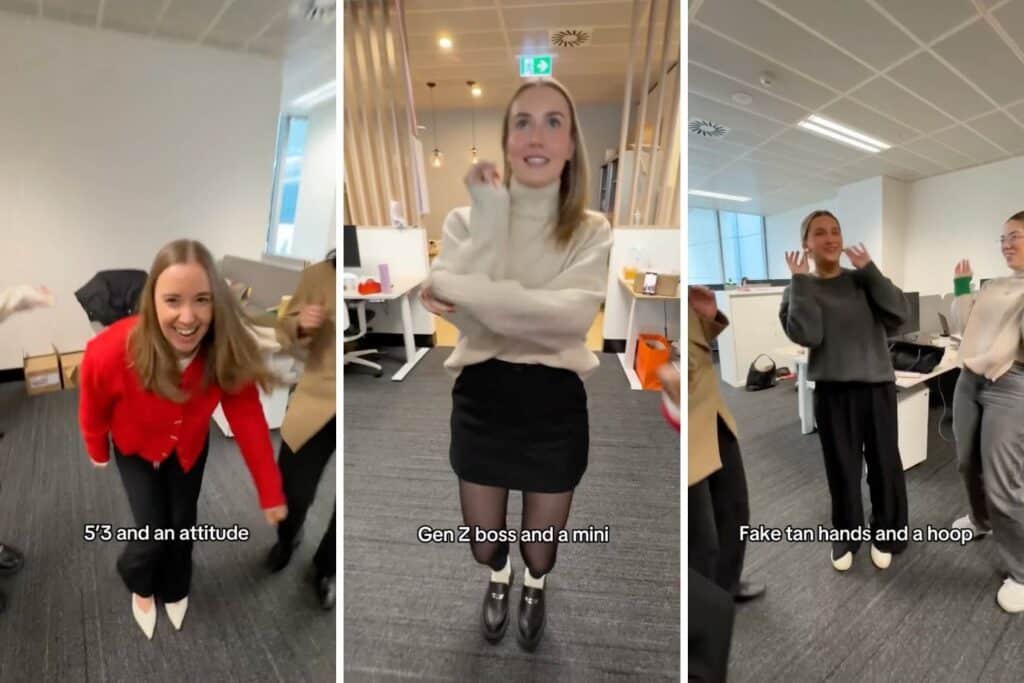You may have seen what’s now become the infamous “Gen Z Boss and a Mini” video circulating in your social media feed. Essentially it’s a group of young corporate women at Aussie brand tbh Skincare dancing in a circle and chanting two identifying characteristics about themselves or their outfit.
You also may have seen Andrew Tate’s response to the video, where he warned that in an emasculated, feminist society “women like this will be your boss”, and suggested these women were “semi-sentient females”.
Girls just want to have fun. And succeed in their careers. But in a world where women still aren’t taken seriously, doing both at once can seem impossible. That is, unless you’re okay with a moment of harmless frivolity being weaponised as evidence of brainlessness and incompetence.
Of course, Andrew Tate isn’t your regular social media lurker. But he’s far from the only person who’s decided that these videos actually warrant a serious debate over whether women “belong” in the workplace.
The original video has since been removed due to concerns over the amount of vitriol being levelled at the staff at tbh Skincare. Nonetheless, duplicates floating around the web continue to produce commentary such as, “And then wonder why you earn less than your male colleagues”, “no real skill in the whole group”, and “women’s suffrage was a mistake.”
In the scheme of things, it’s probably just a vocal minority engaging in this sort of trolling. But even among my own circles, the number of Gen Zers who expressed a deep, visceral contempt for this particular meme got me wondering. Why do we, even us apparently progressive Generation Zers, seem to find light-hearted content so much more cringeworthy when it’s women who are involved?
A recent global study found that 60% of Gen Z men believe women’s equality discriminates against men. This climate of threat helps explain some young men’s territorial attitude towards the Internet, feeling a need to police how certain groups – especially women – participate online and in the workplace.
The vitriol generated by a short video like the “Gen Z Boss and a Mini” clip is astounding given the way men are so often given the benefit of the doubt when they post frivolous things on the Internet. There’s an assumption that they’re acting out of witty, self-aware irony when they share their humour online. Meanwhile, women’s online behaviour is construed as a reflection of their character, intelligence and skill set.
What cultural undercurrents give rise to this sort of double standard? What underlying narratives might we – all of us – internalise that make these sexist knee jerk responses so natural?
Part of the answer may lie in the fact that women’s popular culture has been trivialised basically since the beginning of mass media in the early 20th century. Catharine Lumby who is a Professor of Media Studies at the University of Sydney had this to say:
“Women and girls have always been denigrated for consuming popular culture that appeals to them. For enjoying books, films and social media which speaks to them about their experiences. And god forbid they have a sense of humour about it.”
Lumby points out that in the late 19th century, there was a serious moral panic about women reading novels.
“It was thought, quite rightly, that it might give them ideas about their independence which led to them leaving their controlling husbands. It’s the same thing today. Women having fun online are attacked as brainless and in need of guidance. We have an academic term for that: sexist BS.”
And what’s most outrageous, all this bimboish dancing and time-wasting frivolity occurred in the workplace, a space Lumby says has always been coded as “masculine”. It’s not just that the “Gen Z Boss and a Mini” video isn’t that funny to some people, it’s the sense of encroachment and outrage it produces in threatened young men.
When I came across the videos on Instagram, I was mostly curious. I saw professional young women who looked like me. They had Australian accents and yet the video appeared on a US-based meme account. I discovered that the founder of tbh Skincare, Rachael Wilde, is an extremely accomplished young woman. She started her own brand at 23, and was included in the 2024 Forbes 30 Under 30 List. These women were anything but the “semi-sentient” caricature the Internet tried to make of them.
Professionalism and fun aren’t as incongruous as we once thought. And in the world of media and marketing, they certainly aren’t mutually exclusive. In fact, this viral video has elevated tbh Skincare’s brand, and their strong social media presence has been key in allowing them to speak authentically to their target audience.
It’s time to think about why young men get a lot more licence to have fun on social media. It’s time to wonder why we automatically code women’s performances on social media as trivial and narcissistic, when we give a free pass to young men performing their masculinity in aggressive, albeit ironic, ways.
No one’s saying you have to find the “Gen Z Boss and a Mini” video funny. But if you responded to it with more disgust and anger than you normally would, it’s probably worth thinking about why that might be.



